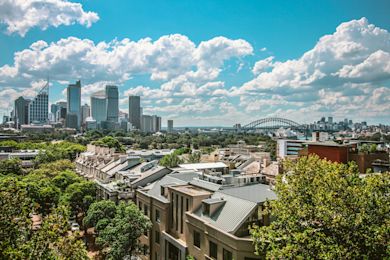- Published: 24 November 2025
- Updated: 24 November 2025
The UK has long been one of the most popular destinations for aspiring doctors around the world. Its medical schools are globally recognised for their high academic standards, innovative teaching, and strong clinical training. For Singaporean students, studying medicine in the UK is not a new path — many have pursued this route for decades due to the country’s rich medical tradition and international prestige.
If you’re considering this journey, here’s everything you need to know about how to study medicine in the UK, including course duration, entry requirements, costs, and what to expect as an international student.
Why Study Medicine in the UK?
Home to Top Medical Schools Worldwide
The UK is home to some of the world’s most respected medical universities, such as the University of Oxford, University of Cambridge, Imperial College London, University of Edinburgh, University of Manchester and University of Glasgow. These institutions are known for combining rigorous academic training with early hands-on clinical experience — an approach that helps students develop practical skills from the very start of their degree.
World-Class Clinical Training and Research Opportunities
You’ll also benefit from access to world-class teaching hospitals and research facilities, often linked directly to universities. This ensures that students learn in real clinical environments alongside leading doctors and researchers.
Internationally Recognised UK Medical Degrees
Another major advantage of studying medicine in the UK is that its medical degrees are internationally recognised, including in Singapore. Many Singaporean students have completed their medical training in the UK and successfully returned home to begin their careers as practising doctors.
For those planning to work in Singapore, it’s important to note that graduates holding medical degrees recognised by the Singapore Medical Council (SMC) are eligible to return to Singapore for medical registration, provided they meet the required criteria and complete the necessary training.
Join the IDP student community
Connect with peers and student ambassadors to hear real experiences, tips, and advice about studying abroad.

UK Medical Degrees Recognised by SMC
If you wish to study medicine in the UK and return to Singapore to continue practising Medicine, here is a list of Singapore Medical Council (SMC) -recognised medical degrees in the UK:
Universities | QS World University Rankings by Subject 2025 (Medicine) |
Cardiff University, School of Medicine | #155 |
City St George’s University of London | #351-400 |
Imperial College London, School of Medicine | #7 |
King’s College London, GKT School of Medical Education | #15 |
Newcastle University, Faculty of Medical Sciences | #95 |
Queen Mary University of London, Barts and The London School of Medicine and Dentistry | #59 |
Queen’s University of Belfast, School of Medicine, Dentistry and Biomedical Sciences | #168 |
University College London, UCL Medical School | #8 |
University of Aberdeen, School of Medicine, Medical Sciences and Nutrition | #194 |
University of Birmingham, College of Medical and Dental Sciences | #67 |
University of Bristol, Bristol Medical School | #59 |
University of Cambridge, School of Clinical Medicine | #5 |
University of Dundee, School of Medicine | #148 |
University of Edinburgh, Edinburgh Medical School | #20 |
University of Glasgow, School of Medicine, Dentistry and Nursing | #44 |
University of Leeds, School of Medicine | #96 |
University of Leicester, Leicester Medical School | #195 |
University of Liverpool, School of Medicine | #74 |
University of Manchester, Faculty of Biology, Medicine and Health | #33 |
University of Nottingham, School of Medicine | #96 |
University of Oxford, Medical Sciences Division | #2 |
University of Sheffield, School of Medicine and Population Health | #106 |
University of Southampton, Faculty of Medicine | #81 |
University of Warwick, Warwick Medical School | #168 |
Please refer to the official SMC website for the most up-to-date information.
How Many Years Does It Take to Study Medicine in UK?
The standard undergraduate medicine course in the UK, usually called MBBS or MBChB, takes 5 to 6 years to complete.
Pathways to Studying Medicine in the UK
There are several pathways you can take depending on your academic background and experience. Here’s a breakdown of the main routes:
1. Foundation Year Pathways / UK A Level Pathways
If you’ve completed Singapore-Cambridge GCE O-Levels, IGCSE, or Year 10 equivalent, you have two main options to progress toward studying medicine in the UK: you can either enrol in a foundation programme or complete UK A-Levels. Both pathways help build the essential science knowledge and study skills needed for entry into a medical degree.
Foundation programmes, often called the International Foundation Year, are designed to prepare students who may need additional support in sciences or academic skills. These programmes typically last around 9 months, providing a fast-track route into undergraduate medicine. Popular foundation year providers include:
Pathway Providers | Programmes | Leading to |
INTO University Partnerships | INTO London: STEM, Medicine and Health: International Foundation in Medicine and Health Professions | University of Bristol Queen Mary, University of London |
Kaplan International Pathways | Medicine and Health Foundation Pathway at University of Birmingham | University of Birmingham |
Study Group | Cardiff International Study Centre: International Foundation Year in Health, Medical and Life Sciences | Cardiff University |
Alternatively, students can take UK A-Levels in key subjects such as Biology, Chemistry, and Physics. UK A-Levels generally take around 2 years to complete and are recognised by all UK universities, making them a widely accepted route for entry into medical programmes. Popular A-Level providers include:
Pathway Providers | Programmes |
CATS College | |
INTO University Partnerships | |
Kings Education | |
MPW College | |
Oxford International College |
Successfully completing either a foundation programme or UK A-Levels provides a smooth pathway to undergraduate medicine in the UK.
2. Direct Entry Pathway
Students who have completed Singapore-Cambridge GCE A-Levels, the IB Diploma, or Year 12 equivalent, can often apply directly to undergraduate medical programmes in the UK. Strong results in subjects like Chemistry and Biology are usually required.
Some universities also offer a 1-year intercalated BSc, which lets you take an extra year during your medical degree to focus on a research project or specialised area of medicine. This experience helps you develop research skills, deepen your understanding of a particular field, and can strengthen your academic profile for future postgraduate study.
If you do not meet the direct entry requirements, a foundation pathway is still a viable route to prepare you for medicine at UK universities.
Singapore polytechnic diploma graduates may also apply for direct entry into UK medical programmes, but the pathway is highly competitive. Only a limited number of universities, such as the University of Edinburgh, University of Birmingham, and University of Bristol, consider diploma holders for medicine.
Alternativaly, polytechnic diploma graduates may also choose to pursue a relevant bachelor’s degree first, then apply for Graduate Entry Medicine, which is often a more structured and realistic pathway.
University | Undergraduate Medicine Programme | Course Length |
Cardiff University | 5 years | |
City St George’s University of London | 5 years, or 6 years with placement year | |
Imperial College London | 6 years | |
King’s College London | 5 years (6 years if an optional intercalated degree is undertaken) | |
Newcastle University | 5 years | |
Queen Mary University of London | 5 years | |
Queen’s University of Belfast | 5 years | |
University College London (UCL) | 6 years | |
University of Aberdeen | 5 years | |
University of Birmingham | 5 years | |
University of Bristol | 5 years | |
University of Cambridge | 6 years | |
University of Dundee | 5 years | |
University of Edinburgh | 6 years | |
University of Glasgow | 5 years | |
University of Leeds | 5 years | |
University of Leicester | 5 years | |
University of Liverpool | 5 years | |
University of Manchester | 5 years | |
University of Nottingham | 5 years | |
University of Oxford | 6 years | |
University of Sheffield | 5 years | |
University of Southampton | 5 years |
3. Graduate Entry Medicine (GEM)
For those who already hold a bachelor’s degree, the graduate entry medicine pathway offers an accelerated four-year medical degree. This route is open to graduates from a variety of academic backgrounds, although some universities may require certain science subjects as prerequisites.
Graduate entry medicine allows students to build on their existing knowledge while completing the core medical curriculum in a condensed timeframe. It’s a great option for those who decide to pursue medicine after finishing another degree.
University | Graduate Programme | Course Length |
Cardiff University | 4 years | |
City St George’s University of London | 4 years | |
Imperial College London | 4 years | |
King’s College London | 4 years | |
Newcastle University | 4 years | |
University of Cambridge | 4 years | |
University of Dundee | Scotgem MBChB via University of St Andrews and University of Dundee | 4 years |
University of Liverpool | 4 years | |
University of Manchester | 4 years | |
University of Nottingham | 4 years | |
University of Oxford | 4 years | |
University of Sheffield | 4 years | |
University of Southampton | 4 years | |
University of Warwick | 4 years |
What are the differences between Graduate Entry Medicine (GEM) and Doctor of Medicine?
It’s important to understand the difference between Graduate Entry Medicine (GEM) and the Doctor of Medicine (MD), as they serve very different purposes.
Graduate Entry Medicine is an accelerated undergraduate medical programme designed for students who already hold a bachelor’s degree. This pathway is ideal for students who decide to pursue medicine after completing a first degree, whether in science or another discipline. The curriculum covers the same core medical training as standard undergraduate programmes, but in a condensed format.
In the UK, the MD is a postgraduate degree rather than the initial medical qualification. It is intended for doctors who have already completed their MBBS/MBChB and want to specialise, conduct medical research, or advance their academic careers. It’s important to note that an MD alone does not qualify you to practise medicine — it is an additional qualification on top of your primary medical degree.
Feature | Graduate Entry Medicine | Doctor of Medicine (MD) |
Level | Undergraduate medical degree (first medical qualification) | Postgraduate research/advanced clinical degree |
Entry Requirements | Bachelor’s degree (any subject, sometimes specific science prerequisites) | MBBS/MBChB or equivalent medical qualification |
Duration | 4 years (accelerated) | 2–3 years |
Purpose | To become a practising doctor | To advance medical knowledge, specialise, or pursue research |
Qualification Outcome | MBBS / MBChB | MD (research/advanced degree) |
Eligibility to Practice | Yes, allows registration with medical councils | Already qualified; MD alone does not grant licence to practice |
Entry Requirements for Medicine in the UK
Getting into a UK medical school is highly competitive, but with careful preparation, it is achievable. Admissions are based on a combination of academic qualifications, aptitude tests, relevant experience, and personal qualities.
Academic Qualifications
Most UK medical schools require A-Level grades of AAA, typically including Chemistry and Biology. Some universities may also consider Mathematics or Physics as a third subject. For students following the IB Diploma, a total score of 32–40 points is usually required, with high-level subjects in the sciences.
If you do not meet the direct entry requirements, some universities offer foundation pathways or graduate-entry medicine programmes.
Admissions Tests: UCAT
With the BMAT now discontinued, the UCAT (University Clinical Aptitude Test) is the primary admissions test used by all UK medical schools.
UCAT (University Clinical Aptitude Test)
The UCAT is a key admissions test required by all UK medical schools. It is designed to assess your cognitive abilities, situational judgement, and logical reasoning skills, which are essential for a future career in medicine.
The test consists of multiple-choice questions across four sections:
Verbal Reasoning – understanding and interpreting written information
Decision Making – evaluating arguments and making sound choices
Quantitative Reasoning – working with numerical data
Situational Judgement – assessing responses to real-world scenarios in a healthcare context
When to Take the UCAT
The UCAT is offered annually from early July to late October, and results are valid for one application cycle only. Students are advised to book early to secure a convenient test date and location.
Tip: Always check the official UCAT website for the latest available test dates.
English Language Requirements
If English is not your first language, you will need to meet English language proficiency standards by taking an English language test. Most universities accept:
IELTS Academic: Overall 7.0, with at least 6.5 in each component
TOEFL iBT: Usually 100+ with minimum scores in each section
Some universities may waive the English language requirement if you have completed previous studies in English or taken English subjects that meet their criteria.
Please always check the specific English language requirements of each university.
Personal Statement and Experience
A compelling personal statement is essential for your medical school application. It should clearly convey your motivation for studying medicine and your understanding of the medical profession. Highlighting relevant experiences can give you an extra advantage, such as:
Volunteering in healthcare settings
Shadowing doctors or other healthcare professionals
Participation in medical or science-related extracurricular activities
Interview
Shortlisted candidates are invited for an interview, which is a key part of the medical school admissions process. Most universities use Multiple Mini Interviews (MMI) — a series of short stations designed to assess communication skills, teamwork, problem-solving, and ethical reasoning. For international applicants, interviews are often conducted online.
Universities use the interview to evaluate qualities that cannot be measured by exams alone, such as empathy, ethical awareness, and effective communication — all essential traits for future doctors.
Cost of Studying Medicine in the UK
Cost of study in the UK for international students vary between universities but generally, tuition fees range from £30,000 to £60,000 per year.
For example, the University of Oxford’s medicine programme costs around £49,400 per year for pre-clinical years for international students (as of 2026).
In addition to tuition, you’ll need to budget for living costs — typically around £13,000–£20,000 per year, depending on your city. London and other major cities tend to be more expensive.
Medicine Scholarships in the UK for Singaporean Students
There are a few scholarships that Singaporean (or other international) students can use to study medicine in the UK — but it’s also important to note that medicine scholarships for international students are relatively limited. Singaporean students can also explore government or private sponsorships.
Lee Foundation Overseas Medical Bursary
Administered by MOH Holdings (MOHH) on behalf of the Lee Foundation.
Supports Singaporean students studying medicine abroad at SMC-recognised medical schools.
Amount: SGD$30,000 in the year of award.
Bond-free.
MOH Pre-Employment Grant (PEG)
Available to Singaporean students doing medicine abroad (if the university is recognised by SMC).
Covers up to 60% of remaining tuition fees, capped at SGD 50,000 per year, up to a maximum of SGD 150,000.
This is a grant, not a loan, but there is usually an expectation to return to Singapore to practise.
University of Dundee — Dow Memorial Trust Scholarship (Medicine)
For undergraduate medicine (MBChB) students.
Value: £2,000 per year for Year 1, 2 and 3; £2,500 in year 4; and £2700 for year 5.
Based on financial need.
Medicine is expensive, and many UK universities do not offer very large merit scholarships for Medicine courses, especially for international undergraduates. Always check university websites for the latest and most accurate scholarship information — amounts, eligibility, and deadlines change annually.
Speak with IDP counsellors or university admissions teams early to better understand your best possible route.
Intake for Medicine Programs in the UK
Usually there are 2 to 3 main intake periods for UK universities. However, most UK medical schools offer one main intake per year, which begins in September. This means that students must carefully plan their applications and meet all deadlines for that cycle.
Applications for medicine must be submitted through UCAS by the mid-October deadline (15 October) of the year before entry (earlier than most other undergraduate courses).
Some universities may review applications as they come in, so submitting early can improve your chances of being shortlisted for interviews.
Application Process for Medicine Programs in the UK
Applying to a UK medical school requires careful planning, as the process is competitive and highly structured. Here’s a step-by-step overview:
1. Choose Your Universities
You can apply to up to four medical schools through UCAS, with the option of a fifth choice for another course, such as biomedical sciences, as a backup in case your medicine applications are unsuccessful.
When selecting your universities, consider important factors such as location, course structure, entry requirements, and reputation.
2. Meet Academic and Test Requirements
You should ensure you have the required A-Level or IB grades, or meet the prerequisites for foundation/graduate entry pathways.
You will also need to take the UCAT, which assesses cognitive abilities, situational judgement, and logical reasoning. The UCAT is offered annually between July and October, and results are valid for one application cycle only.
Some universities may also require proof of English proficiency, though this can sometimes be waived if you have completed prior studies in English or taken English subjects that meet the university’s criteria.
3. Prepare Your Personal Statement
A strong personal statement is an essential part of your application. It should demonstrate your motivation for studying medicine, your understanding of the medical profession, and highlight any relevant experiences.
Keep in mind that your personal statement will be submitted for all five choices, so your fifth-choice course should still align with the content and focus of your statement.
4. Submit Your UCAS Application
It is important to note that your Medicine applications must be submitted through UCAS by mid-October (15 October) of the year before entry.
Required documents typically include your personal statement, predicted or achieved grades, UCAT results, and a reference letter. Depending on the university, you may also need to provide evidence of English language proficiency or details of relevant work or volunteer experience.
5. Attend Interviews
Once your UCAS application is submitted, shortlisted candidates will be invited to attend an interview.
Most universities use Multiple Mini Interviews (MMI), consisting of short stations designed to assess communication skills, ethical reasoning, problem-solving, and teamwork.
For international applicants, interviews are often conducted online. The interview allows universities to evaluate qualities that cannot be measured by exams alone, such as empathy, ethical awareness, and effective communication.
6. Receive Offers and Make Your Choice
Successful applicants will receive either conditional offers (based on final grades) or unconditional offers.
Once offers are received, you can choose your preferred medical school through the UCAS system.
Tip: Because the application process is competitive and the number of places is limited, it is important to start preparing at least a year in advance to manage exams, UCAT preparation, personal statement writing, and interview practice.
Challenges and Considerations When Studying Medicine in the UK
While the UK is a top destination for medical studies, students should be aware of the challenges that come with pursuing such a competitive and rigorous pathway.
High Competition for International Students
Medical schools in the UK have strict quotas for international students, typically offering only 10–30 seats per intake. Most programmes accept new students only in September, making each admission cycle extremely competitive. Strong academic results, relevant experience, and a compelling application are essential.
Academic Intensity and Heavy Workload
Students can expect long study hours, continuous assessments, and a fast-paced learning environment. Excellent time management and self-discipline are crucial to keep up.
Long Training Pathway
Even after completing a 5–6 year medical degree, training doesn’t stop there. Graduates must go through Foundation Training (2 years) followed by specialty or GP training, which can take several additional years. It’s a long-term commitment that requires dedication and resilience.
Cultural and Social Adjustment
Studying in a new country means adapting to different teaching styles, living arrangements, social norms, and weather. For many Singaporean students, adjusting to the more independent learning style and colder climate may take time. However, many find the experience enriching and rewarding once they settle in.
Pathways After Graduating from a Medicine Program in the UK
Graduating from a UK medical school opens multiple pathways, depending on your long-term career goals. Whether you plan to return to Singapore, continue training in the UK, or explore opportunities abroad, UK qualifications are globally respected and widely recognised.
Below are the common pathways that students take after graduation.
1. Continue practising Medicine in the UK
Most UK medical graduates continue into the UK Foundation Training Programme, a 2-year structured training pathway:
Foundation Year 1 (FY1): Supervised practice where you work as a junior doctor and build core clinical competencies. Completing FY1 allows you to gain full registration with the General Medical Council (GMC).
Foundation Year 2 (FY2): You work more independently across different specialties to prepare for further training.
After FY2, graduates can apply for specialty training, which varies by field:
General Practice (GP) Training: Around 3 years
Specialty Training (e.g., Internal Medicine, Surgery): Typically 5–8 years depending on the specialty
Entry into specialty training is often competitive and is managed through a selection scheme, which assesses your performance during foundation years, relevant experience, and suitability for the chosen specialty.
2. Returning to Singapore to pursue a medical career
Singaporean students who graduate from a Singapore Medical Council (SMC)-recognised UK medical school may return to Singapore to pursue medical registration.
Key steps include:
Apply for medical registration with SMC (usually Conditional Registration for new graduates)
Work in a public healthcare institution under supervision
Progress to Full Registration after meeting required training and performance standards
Graduates should always refer to the SMC website for the latest updates on recognised degrees and registration guidelines.
3. Practising Medicine in other countries
UK medical degrees are widely recognised around the world, making it possible for graduates to work in many countries, including Australia, New Zealand, Canada, Ireland and beyond. Additional exams, for example, USMLE for the US or MCCQE/USMLE route for Canada, are required.
Each country has its own regulatory requirements, so graduates should research and prepare early if they intend to practise outside the UK or Singapore.
4. Non-clinical and research pathways
Not all medical graduates choose to continue into direct clinical practice. A UK medical degree also opens doors to a wide range of non-clinical and research-focused careers. Some graduates move into areas such as healthcare management, public health, medical education, communication, or work within the pharmaceutical and biotechnology sectors.
Others pursue research pathways, either full-time or alongside their clinical training, often through postgraduate study, academic medicine, or roles within research institutions.
Conclusion and Next Steps
Studying medicine in the UK offers an exceptional foundation for a global medical career. With world-class training, strong clinical exposure, and internationally recognised qualifications, the UK continues to be one of the most popular and trusted destinations for aspiring doctors from Singapore.
Every year, many Singaporean students choose the UK for their medical studies and later return to become respected healthcare professionals in Singapore and beyond. With the support of IDP counsellors, students can receive personalised guidance throughout the entire journey — from selecting universities and preparing for admissions tests to submitting applications, arranging accommodation, and preparing for their student visa.
If you’re ready to take the next step, speak to an IDP counsellor today to explore your study options, understand your entry pathways, and plan your application timeline for UK medical schools.
Fill out the enquiry form below today to get our guide on entry requirements for Medicine courses in Australia and the UK!
FAQs
一个帐号满足你所有的留学需求
创建您的个人资料,解锁一系列功能,包括个性化推荐、快速申请等等。











